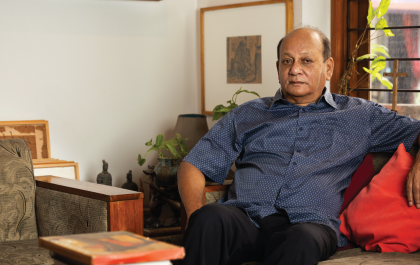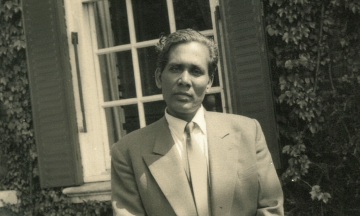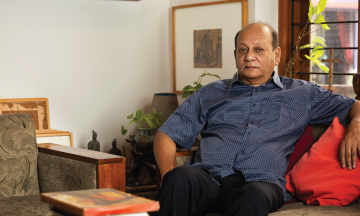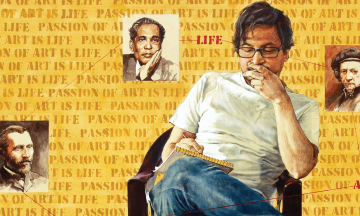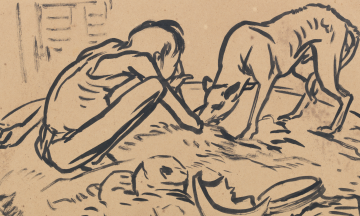Musical prodigy Pritom Hasan’s journey into music wasn’t a grand, orchestrated entry, rather it was a gradual evolution. Growing up in a household where music was ever-present, thanks to his father, the renowned Khalid Hassan Milu, and his brother, Protik Hasan, Pritom never felt pressured to follow the same path. In fact, he initially considered a completely different career. But music found its way into his life in unexpected ways. Here, the star joins us for an insightful chat
By Ayman Anika
Pritom Hasan carries a kind of effortless charm – whether it’s in his music or his presence on screen that resonates with a generation raised on digital culture.
However, his journey into music wasn’t a grand, orchestrated entry, rather it was a gradual evolution. Growing up in a household where music was ever-present, thanks to his father, the renowned Khalid Hassan Milu, and his brother, Protik Hasan, Pritom never felt pressured to follow the same path. In fact, he initially considered a completely different career. But music found its way into his life in unexpected ways – through casual experimentation at home, through his brother’s encouragement, and eventually, through working under Habib Wahid as an assistant music producer. What started as a fun creative outlet slowly turned into a full-fledged profession.
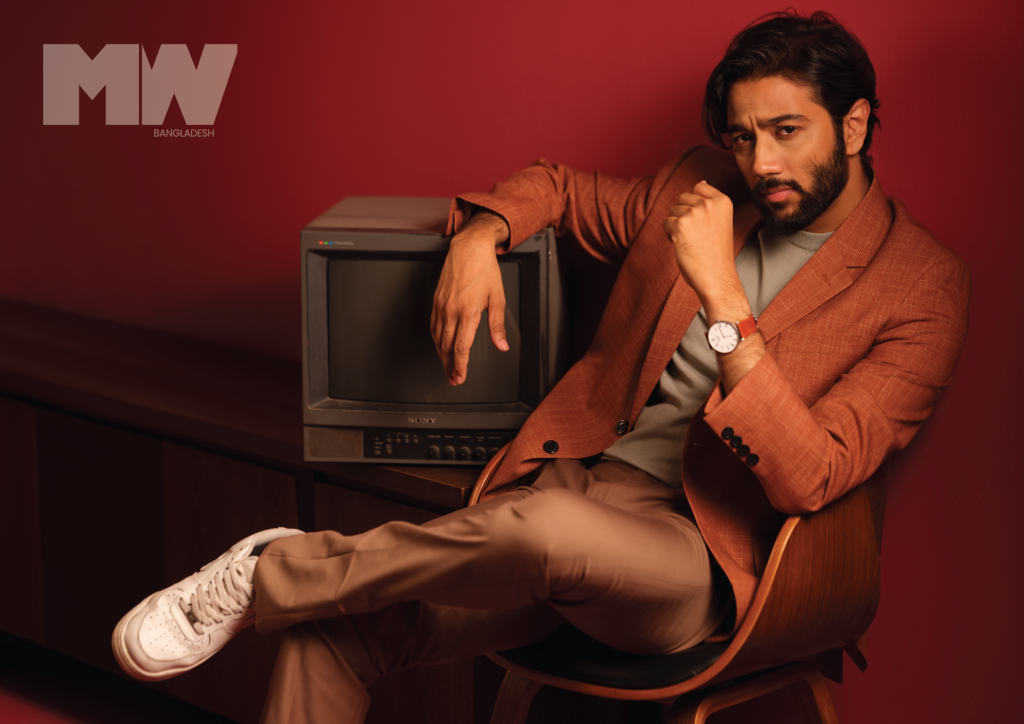
Even his transition into acting was never about chasing the limelight – it was an extension of his love for narratives. His music videos have always carried a cinematic quality, and it was only natural that this sensibility led him to projects like Pett Kata Shaw (2022), Kacher Manush Dure Thuiya (2024) and the upcoming film Ghumpori (2025).
The talented singer, music producer, and actor who has captivated us with hits like “Maloma,” “Deora,” and “Laage Ura Dhura” spoke with MWB, oering insights into his musical and acting journey, creative process, and what lies ahead.
Growing up in a home filled with music, with your father being the renowned musician Khalid Hassan Milu and your brother Protik Hasan also in the industry, was music always something you felt destined for, or did you ever wrestle with the idea of forging a different path?
whether through the cassettes and CDs playing around me or my mother regularly playing my father’s songs – music was undoubtedly a part of my life. However, I never engaged with it in a particularly serious way. While I wouldn’t say that I was constantly surrounded by musical instruments, music was subtly woven into my daily experiences from childhood.
After my father fell ill, my exposure to music gradually lessened. I found myself listening to it less and less. However, my brother, Protik Hasan, played a role in keeping music in my life – he would bring home cassettes of English songs, and I remember being introduced to artists like Enrique Iglesias and Backstreet Boys through him.
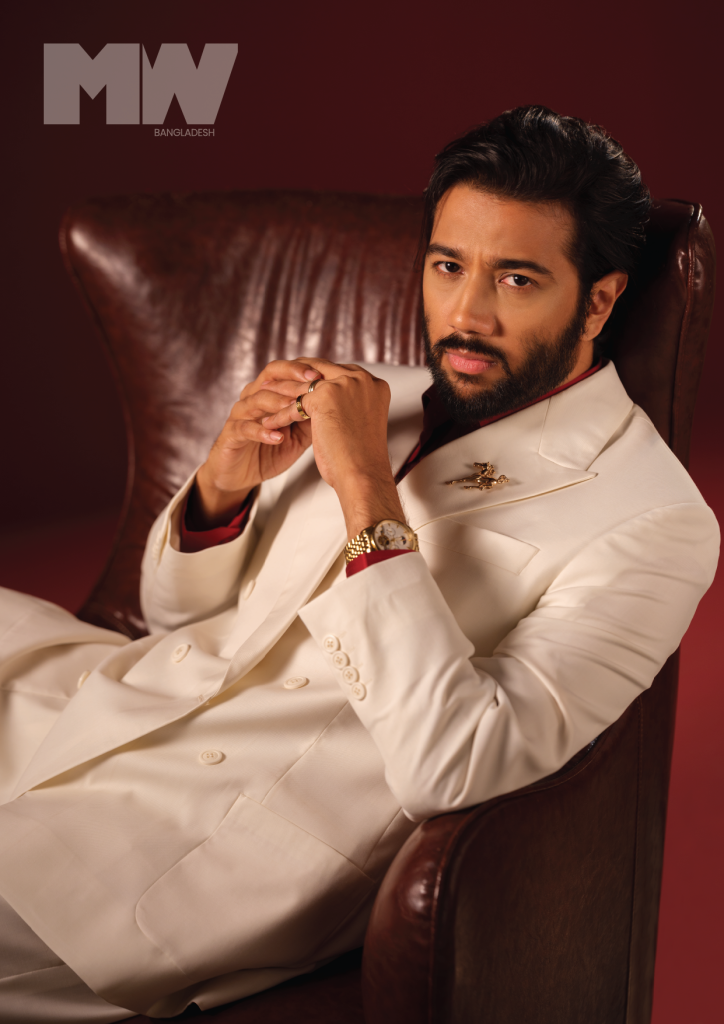
Despite belonging to a musical family and being surrounded by my father’s songs – often even covering them myself – I never saw music as my inevitable path. My aspirations lay elsewhere. I wanted to pursue academics, study English, and had dreams of joining the defense sector. My plan was to complete my studies and find a stable job outside of music.
But life, as it often does, had its own way of guiding me. Over time, I realized that music had always been there – not as a professional pursuit, but as something I enjoyed, a fun and natural part of my life. So, in many ways, I never took music seriously in the beginning, but it remained a constant presence nonetheless.
What’s your earliest memory of your father’s music? Do you remember the first time you truly understood its impact on people?
We initially lived in the Mohanagar Project, Dhaka. However, after my father fell ill, we moved to Tongi, where we stayed for about seven to eight years. To be honest, I was quite young when my father was alive, and in many ways, I didn’t get to spend as much time with him as I would have liked. My memories of him as a mature boy mostly involve seeing him bedridden.
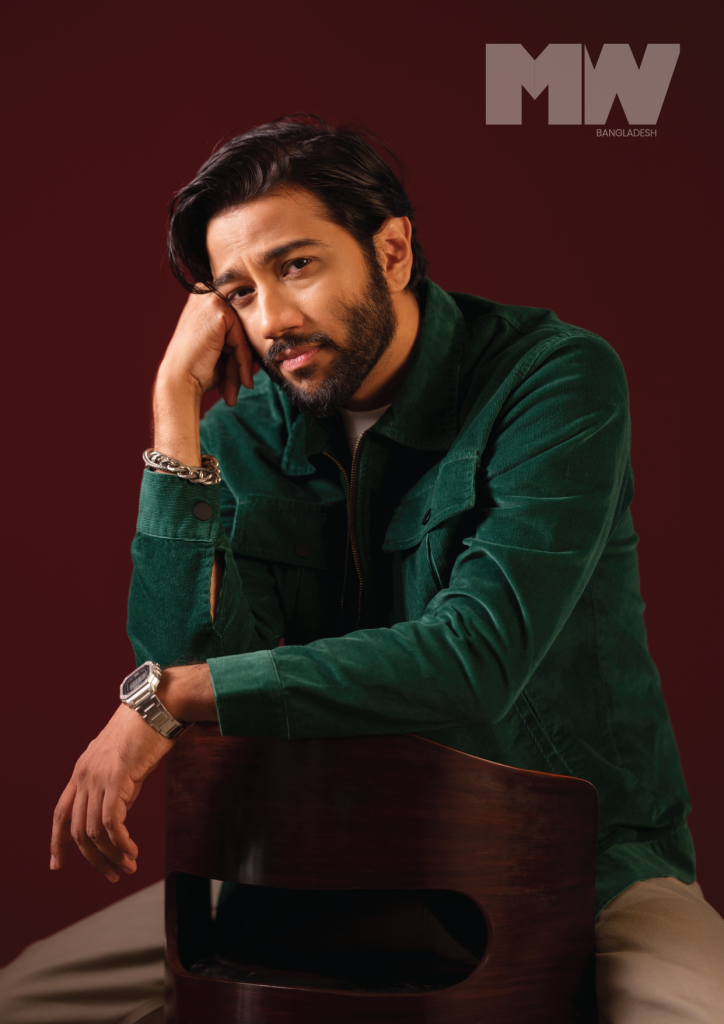
That being said, I do have some cherished memories of his music. I remember watching him go to recording studios, and on occasion, he would take me along. I would see him recording songs for films, which, looking back, was a special experience. At home, he was always practicing, but we weren’t allowed to enter his room while he was rehearsing. So, while I wasn’t always directly involved in his musical journey, these moments – watching him in the studio, and hearing his voice fill our home – are some of my earliest and most vivid memories of my father’s music.
Your music is quite different from your father’s era – more experimental, more hybrid in genre. Do you ever wonder how he might have reacted to your sound?
I’m not entirely sure how my father would have reacted to my sound, but to be honest, I don’t dwell on it too much or feel any pressure about it. I am content with the kind of music I am creating now, and my artistic direction has naturally gravitated toward folk music.
For me, folk music isn’t just a genre – it’s a responsibility. My guiding principle in making folk music has always been to uplift and promote folk artists, to bring their songs and their unique styles to a wider audience. A significant portion of my work in the industry is dedicated to this mission, and along the way, I have had the privilege of collaborating with some incredibly talented people. Seeing them thrive and getting to be a part of their journey has been deeply fulfilling for me.
At the end of the day, we all have to carve out our own paths, and I’m glad that mine has led me in this direction.
Your brother Protik Hasan is also a musician. What’s the dynamic like between you two?
My brother, Protik Hasan, and I have collaborated on several fun projects, such as “Beainshab” and “Kababer Haddi.” These songs were specifically created with the festive energy of Dhaka’s wedding culture in mind, and working on them together was a great experience.
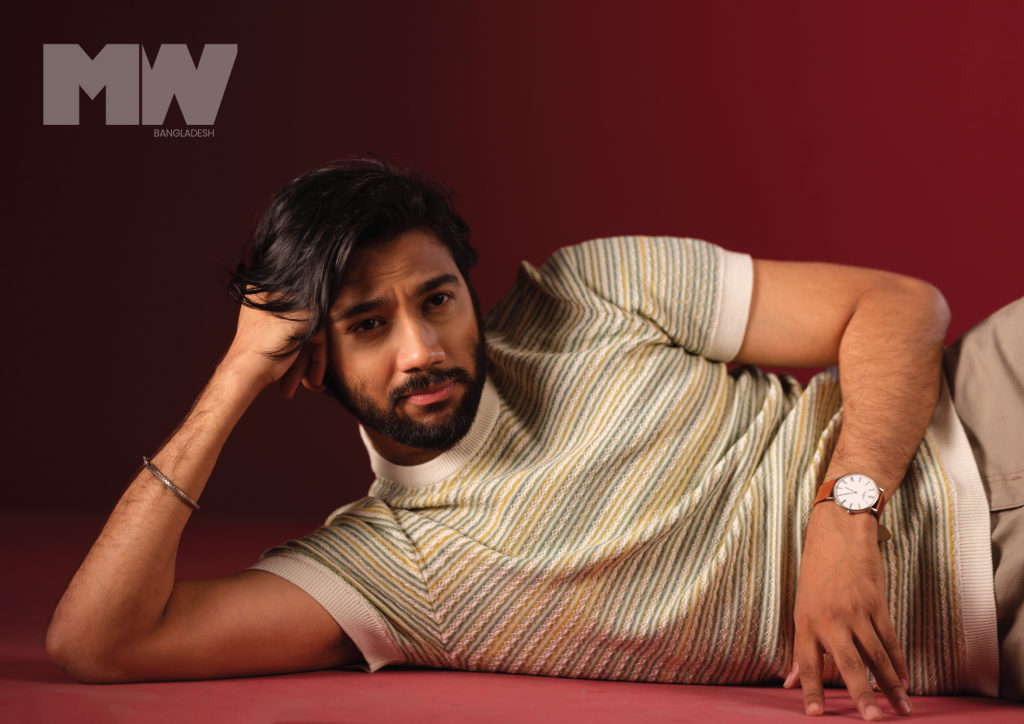
As for our dynamic, in the beginning, things were a bit different. When I first started getting into music, Protik bhai had his own approach to the industry, and I was still finding my footing. However, as I became more involved and started making a name for myself, he saw me growing and evolving as an artist.
Over time, I think he developed a sense of respect for the way I work. Being the elder brother, he always looked out for me, but as he saw me progressing independently, he became genuinely happy and started trusting my choices more.
Now, I feel that he fully respects the way I operate within the industry, and our bond remains strong. When it comes to our relationship, it’s very much a bhai-bhai dynamic – rooted in mutual understanding, support, and a shared sense of family. We’ve found a good balance between being brothers and being fellow musicians, and that’s something I really appreciate.
You started your career as an assistant music producer under Habib Wahid. What was that experience like?
I started my journey in music quite casually, experimenting with composition at home as a fun project. Initially, I never saw it as a career path – I was just playing around with sounds. It was actually my brother, Protik bhai, who first encouraged me to compose a couple of songs. That’s when it struck me – oh, this can actually be a profession! However, at that time, I had no formal training or in-depth knowledge of music production.
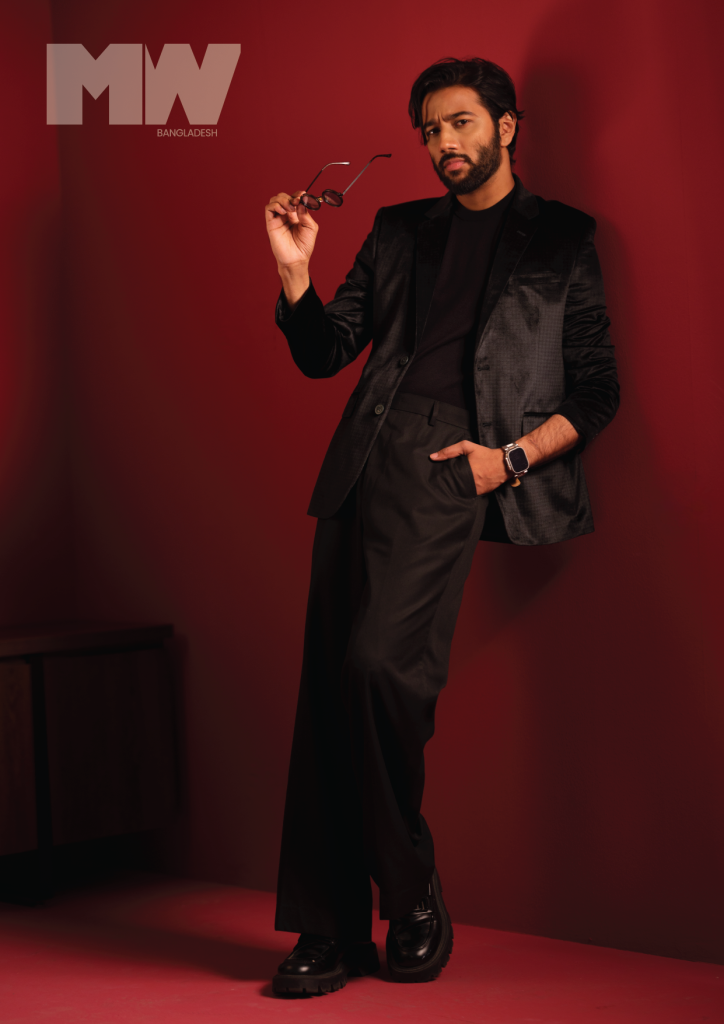
Everything changed when I met Habib bhai. It all started with a jingle for a telecommunications company – Protik bhai was originally supposed to sing, but he suggested that I do it instead. That moment led me to Habib bhai’s studio, where I got the opportunity to work with him, and from there, a strong bond developed between us.
To this day, I consider him one of my most respected mentors. We share a deep teacher-student relationship, and I owe a lot of my growth to him. He not only introduced me to the professional side of the industry but also encouraged me to step out of my comfort zone. In fact, it was Habib bhai who pushed me to take music more seriously – he advised me to move out of my house, immerse myself in the craft, and truly commit to the profession.
Looking back, I feel incredibly lucky to have had him as my mentor. His guidance shaped the artist I am today, and for that, I will always be grateful.
Do you share a similar bond with anyone else?
From Habib bhai, I learned not just the fundamentals of music composition but also the importance of professionalism, discipline, and punctuality – qualities that are essential in the industry. However, as I progressed in my career, I had the privilege of learning from other senior artists as well. Meeting Tahsan bhai, Balam bhai, Adit Rahman, and Arnob bhai exposed me to different perspectives and valuable lessons, each shaping me in unique ways.
I still remember when Habib bhai advised me to move out and fully dedicate myself to music –that’s when I rented a studio room from Adit bhai. That period was crucial in my growth, and in the process, I developed a strong bond with him. Over time, my connection with Arnob bhai also deepened, especially through our shared experience with Coke Studio Bangla.
So, in a way, Habib bhai was the one who introduced me to this industry, but my journey allowed me to forge meaningful relationships with other mentors along the way. Each of them has contributed to my evolution as an artist, and I’m grateful for the lessons and support I’ve received from them.

How do you make music from scratch?
The process of making music varies depending on the inspiration – it can begin in multiple ways. Sometimes, it all starts with a tune that comes to mind, while other times, the process begins with a beat, a rhythm, or even a simple musical phrase.
There are moments when I compose a section first, and from there, I start layering dierent elements, refining the tune as I go. Other times, I work with an existing melody – perhaps something created by someone else – and gradually develop the composition around it. Personally, I enjoy this approach the most, as it allows for a more organic and collaborative evolution of the music.
Ultimately, there is no fixed formula. Each song has its own journey, and the process adapts based on the emotion and vision behind it.
You transitioned from being behind the scenes to being front and center as a performer. Was there ever hesitation in making that leap?
No, actually, there was never any hesitation. In Coke Studio Bangla Season 1, I sang, but in Season 2, I focused entirely on my role as a music producer. For me, stepping into the spotlight wasn’t something I forced – it happened when I felt the timing was right and the platform was a meaningful space where I could contribute. I’ve always prioritized creating music and bringing forth other talents rather than focusing on myself as a performer.
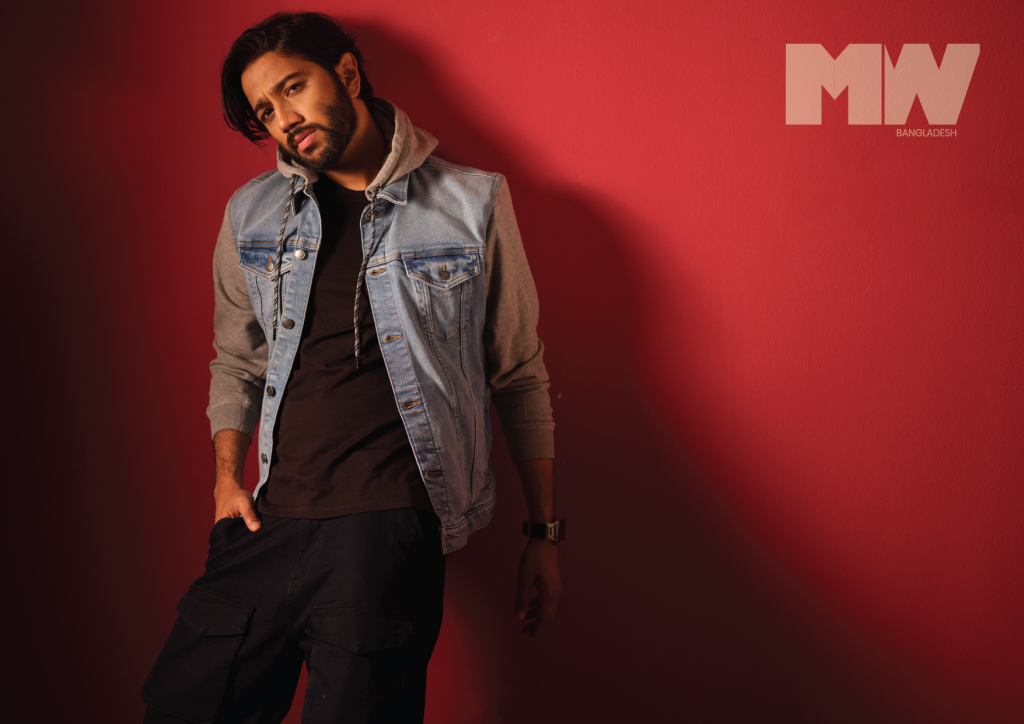
That said, two people played a crucial role in pushing me toward this transition: Asif Iqbal, the Founder and Owner of Gaanchill Music, and Tanim Omer. They were the ones who encouraged me, even down to the smallest details – like how to carry myself, how to act, and how to present myself in music videos. Honestly, they were the ones who forced me out of my comfort zone, and in many ways, I received my initial training from them.
So, while I naturally gravitated toward being behind the scenes, their influence helped me step forward as a performer when the time was right.
Music and acting are both forms of story-telling, but they demand different things from an artist. What first drew you to acting?
I think my interest in acting naturally grew from my involvement in music videos. A little bit of acting is always required when performing in music videos, especially in the story-telling elements. Over time, I realized how much I enjoyed bringing the narrative of a song to life visually, and that’s what initially drew me toward acting.
When I create music, I tend to visualize stories in my head – how a particular song would look and feel if translated into a scene. That’s why my music videos often have strong storylines and dramatic elements. I believe my passion for story-telling through music naturally extended to acting.
Interestingly, acting has also deepened my understanding of music. Once I started acting, I became more attuned to emotions on a visual level, which, in turn, enhanced the way I approach music. I now connect with the emotional depth of a song more vividly, making it easier to translate those feelings into my performances. Both art forms have complemented each other in my journey, and I remain open to exploring both as they continue to shape my creative expression.
I truly believe that the best acting happens when you’re not acting – when it feels completely natural. The most effective performances come from being authentic rather than trying to “perform” in a conventional way.
For that, I have to give a lot of credit to Nuhash Humayun. He has always advised me to be as natural as possible on-screen – don’t try to act, just be yourself, and that will work. That advice really shaped my approach. To be honest, I never had any formal training in acting, nor was I someone who grew up watching a lot of dramas with the dream of being an actor. I wasn’t a hardcore fan of Bangla drama in that sense. But when I did step into acting, I realized that my process was all about staying true to the emotions rather than over-exaggerating them.
Nuhash played a huge role in training me during my early days, and his guidance helped me embrace a more organic and instinctive approach to acting. That influence still stays with me, shaping how I navigate performances today.
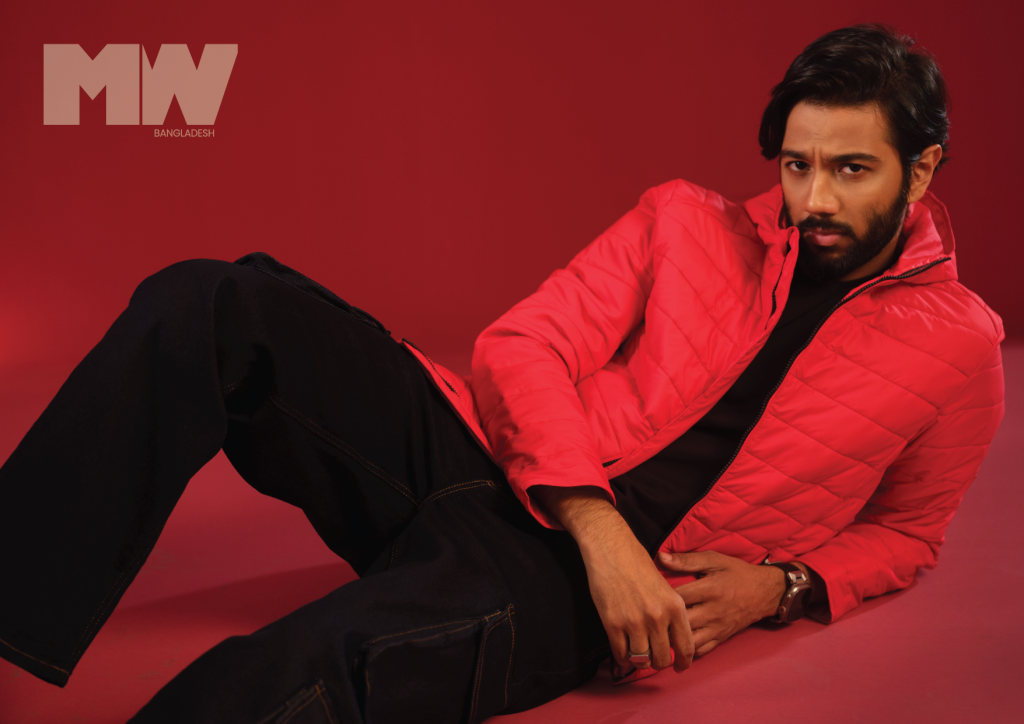
Can you share any interesting story behind your recent music score “Bagan Bilash” with Elita Karim and Jaya Ahsan?
“Bagan Bilash” was a truly special project – one that brought together an incredible team of creative minds, each adding their unique touch to make it what it became. Initially, when we first started working on it, we had a dierent concept in mind. However, after some discussions, we realized that our original plan felt a bit outdated, and it wasn’t resonating the way we had hoped. That’s when we decided to take a fresh approach, and things started falling into place organically.
The collaboration came about when Jaya Ahsan approached me with the idea. At first, it was meant to be a simple promotional song, but I immediately saw the potential to turn it into something much bigger and more meaningful. Jaya apu has always been an inspiration – not just because of her acting skills but also because of the way she carries herself as an artist. Her dedication to her craft and her deep understanding of story-telling made it an exciting opportunity for me. When she proposed the idea, I was on board without any hesitation.
Once we decided to move forward, I proposed a concept that I felt would complement all of us. To my delight, Jaya apu loved it instantly. At that point, Sadia Islam Roza, the director, came in and added her creative vision. She had a very clear understanding of how to shape the story and bring out the emotions visually. The story-telling aspect was crucial to this project, and having Roza’s directorial input really helped refine the narrative.
Another key collaborator was Elita Karim, whose voice and musical sensibility played a vital role in shaping the song’s emotional depth. Throughout the process, we constantly exchanged ideas, adjusting elements here and there, making sure everything blended seamlessly. The final melody turned out to be even more beautiful than what I had originally envisioned.
Looking back, what made “Bagan Bilash” so special wasn’t just the music itself but the synergy between everyone involved. This project brought together Jaya Ahsan, Elita Karim, Roza, and myself – all of us contributing our own expertise and passion. It was one of those rare collaborations where everything just clicked, and the process felt as fulfilling as the final result. I feel incredibly grateful to have been part of this journey, and I couldn’t be happier with how it turned out.
Tell us about your upcoming project Ghumpori.
Yes, I’m acting in Ghumpori, and I’m really excited about it! This project is special to me because it brings together both fresh and experienced talent, making it a unique learning and collaborative experience.
One of the most exciting aspects is working with Parsha Mahjabeen Purnee, a newcomer who is primarily known as a singer but is now stepping into acting. At the same time, I have the opportunity to share the screen with Tanjin Tisha, who has been in the industry for quite a while. Watching her act up close was an incredible experience – she is truly phenomenal on screen. This time, I got to witness her acting skills firsthand, and I was completely mesmerized by how effortlessly she brings emotions to life.
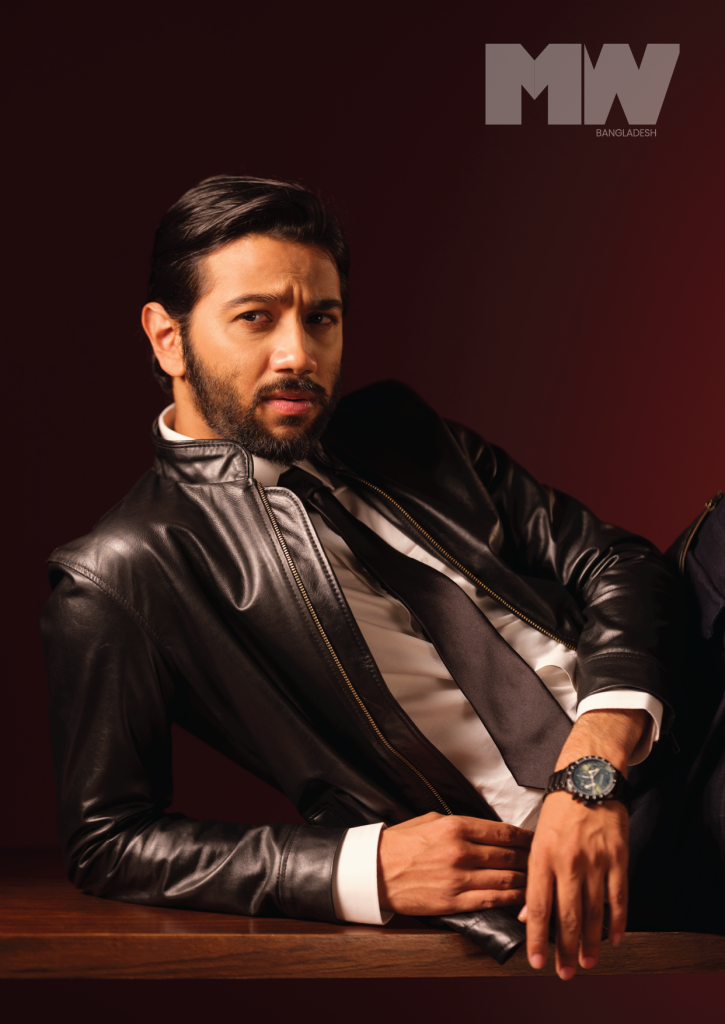
On the other hand, working with Purnee was a different kind of experience. Since she is relatively new to acting, I tried my best to support and guide her through the process. Seeing her reminded me of my own early days – the challenges, the uncertainties, and the effort it takes to grow in this space. I could relate to the difficulties she faced, so I made sure to help her navigate those moments. She was incredibly attentive, eager to learn, and performed with great sincerity. I genuinely believe that with time, she will become an even better actress.
The film is directed by Zahid Pritom bhai, who has quickly become one of my favorite directors. His work in Tilottoma and Buk Poketer Golpo was outstanding, and I admire his story-telling skills. Ghumpori marks his first project in the OTT space, and I’m really happy to be part of it.
As for the story itself, it’s a beautifully complex love story – nothing extravagant, nothing overly dramatic, just a raw and heartfelt narrative that feels very real and relatable. It portrays emotions in a way that audiences can connect with, making it a compelling experience. The project was quite challenging for all of us, but I hope people will appreciate the authenticity and depth of the story once it’s released.
When you’re not making music or acting, what’s your go-to way to unwind?
When I’m not making music or acting, my go-to way to unwind is still the studio.
If you could have dinner with someone – dead or alive, real or fictional – who would they be?
If I could have dinner with anyone, it would be Michael Jackson.
Some people travel for adventure, while others seek tranquillity. What’s your personal travel philosophy?
For me, travelling is all about seeing the world – not just as a tourist, but as someone who truly absorbs the experiences along the way. What fascinates me the most is the transition of cultures, the way they shift and evolve as you move from one place to another.
What’s next for Pritom Hasan?
Right now, I have a lot of exciting projects in the pipeline, but I can’t reveal anything specific just yet. There are things I’m working on – both in music and beyond – that I’m really excited about. So, for now, you’ll just have to wait and see what’s coming next. But I promise, there’s a lot to look forward to!
Fashion Direction & Styling: Mahmudul Hasan Mukul | Photographer: Kaushik Iqbal | Make-up & Hair Style: Sumon Rahat | Assistant Stylist: Arbin Topu | In Association with FIT ELEGANCE & RISE
- mahjabin rahman
- mahjabin rahman
- mahjabin rahman
- mahjabin rahman
- mahjabin rahman
- mahjabin rahman
- mahjabin rahman
- mahjabin rahman
- mahjabin rahman
- mahjabin rahman






